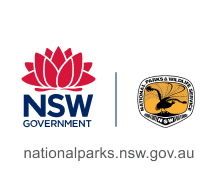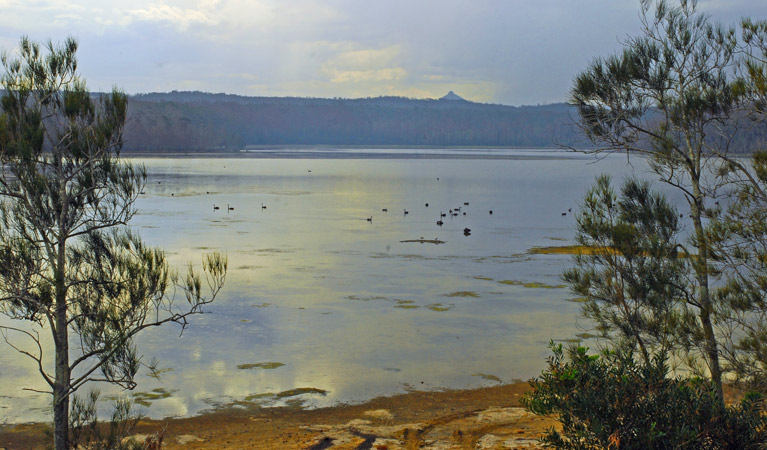Tabourie Lake
Meroo National Park
Overview
Tabourie Lake is a beautiful coastal lake ideal for fishing, paddling, windsurfing, swimming, walking and birdwatching.
- Where
- Meroo National Park in South Coast
- Accessibility
- Medium
- What to
bring - Hat, sunscreen, drinking water
- Please note
- Remember to take your binoculars if you want to go bird watching.
Just a short drive from Ulladulla, Tabourie Lake is a beautiful coastal lake offering visitors a myriad of things to do. Throw down a picnic rug and relax on the shores of the lake with a good book or the weekend newspapers. Go walking along the foreshore and find yourself a place to set up and try your luck fishing. The kids will love wading and swimming in the shallow waters. Or admire the scenery from the water itself by sailing, paddling or windsurfing into the distance.
Tabourie Lake is also haven for waterbirds so if you enjoy birdwatching, make sure to bring your binoculars. You’ll see swans, ducks, birds of prey, egrets and many more.
Map
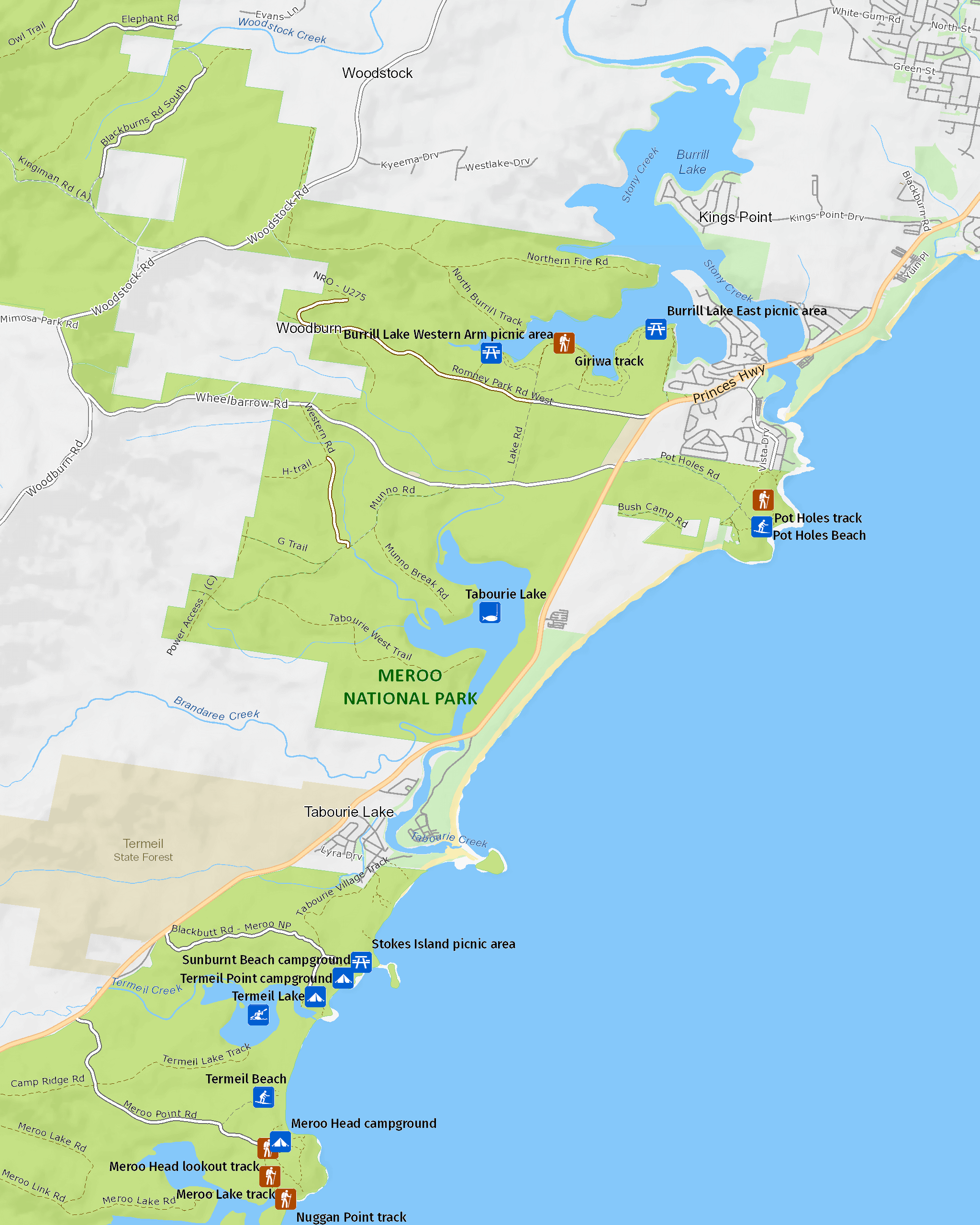
Map legend
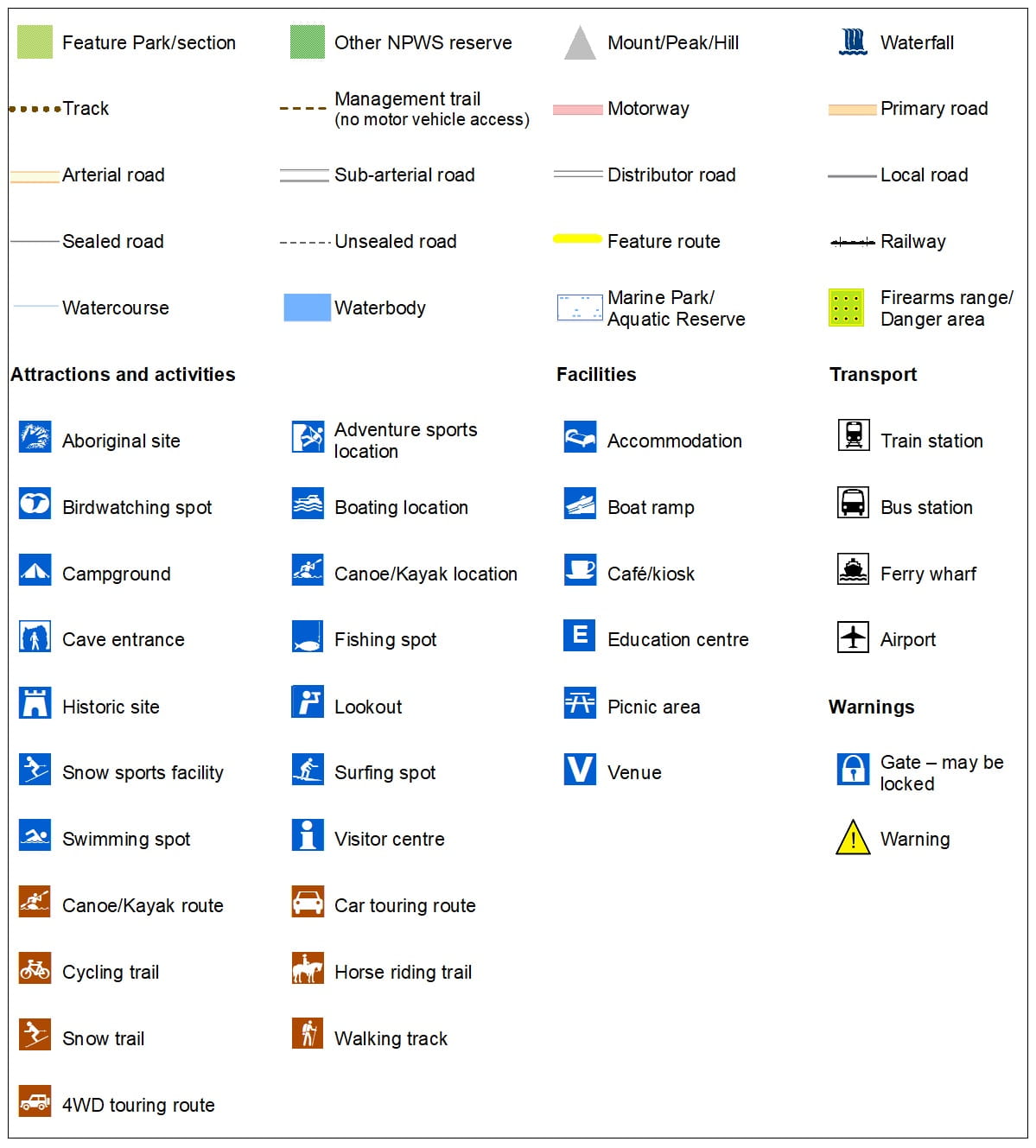
Local alerts
For the latest updates on fires, closures and other alerts in this area, see https://www.nationalparks.nsw.gov.au/things-to-do/fishing-spots/tabourie-lake/local-alerts
General enquiries
- National Parks Contact Centre
- 7am to 7pm daily
- 1300 072 757 (13000 PARKS) for the cost of a local call within Australia excluding mobiles
- parks.info@environment.nsw.gov.au
Park info
- in Meroo National Park in the South Coast region
Meroo National Park is always open but may have to close at times due to poor weather or fire danger.
Visitor info
All the practical information you need to know about Tabourie Lake.
Maps and downloads
Learn more
Tabourie Lake is in Meroo National Park. Here are just some of the reasons why this park is special:
Amazing wildlife haven

Meroo and Termeil Lakes are listed in the National Directory of Important Australian Wetlands and stand out for their abundance and diversity of mammals and frogs. The park also has at least 12 threatened wildlife species, including significant populations of the nationally endangered green and golden bell frog. As you explore the coastline keep a lookout to spot dolphins and whales off the coast. Thee's also excellent opportunities for birdwatching at Meroo. You'll see ducks, swans, pelicans, honeyeaters, superb blue wrens and pied oystercatchers. You might also spot sea eagles or an osprey soaring overhead. And if you're really lucky, you might even see a pair of hooded plover. There are less than 25 pairs known to occur in NSW, and the Meroo, Termeil and Willinga Lake entrances are prime breeding habitats for this vulnerable species.
- Meroo Lake walking track Wrap yourself in the tranquillity of calm coastal waters at Meroo Lake walking track. Enjoy paddling, swimming, fishing, birdwatching and walking in a pristine natural landscape.
- Tabourie Lake Tabourie Lake is a beautiful coastal lake ideal for fishing, paddling, windsurfing, swimming, walking and birdwatching.
Pristine natural landscapes

The coastal lakes, foreshores and wetlands you'll find in Meroo are outstanding examples of pristine natural environments. Only 10% of NSW estuaries remain in such a natural condition. This unspoilt landscape supports endangered ecological communities like the swamp oak floodplain forest and bangalay-banksia dry forest and helps to protect vulnerable plant species such as the tangled bedstraw and leafless tongue orchid.
- Meroo Head lookout walking track You can’t miss the spectacular coastal views from Meroo Head lookout walking track. It’s an easy walking track and a great place for birdwatching and whale watching.
- Nuggan Point walking track Go walking or mountain biking on this easy trail. Enjoy breathtaking coastal views, fishing, whale watching and birdwatching at Nuggan Point, then stop at Meroo Beach for a swim.
Rich Aboriginal culture

Meroo National Park forms part of the traditional lands of the Budawang and Murramarang tribes, who are part of the Dhurga language group. Meroo Lake has important spiritual significance for local Aboriginal groups because, along with other lakes in the region, it is connected to the Pigeon House Didthul creation stories that connect them with their country and ancestor spirits. The park is rich with archaeological sites including shell middens, open campsites, artefact scatters, stone arrangements, rock shelters and a burial site.
- Giriwa walking track Discover Aboriginal cultural heritage along Giriwa walking track, in Meroo National Park. Enjoy the natural beauty of Burrill Lake, near Ulladulla, then stop for a picnic, swim or kayak.
Plants and animals protected in this park
Animals
-

Green and golden bell frog (Litoria aurea)
The green and golden bell frog is an endangered Australian frog. Once common on the NSW coast and tablelands, populations have plummeted around 90 percent.
-

Humpback whale (Megaptera novaeangliae)
The humpback whale has the longest migratory path of any mammal, travelling over 5000km from its summer feeding grounds in Antarctica to its breeding grounds in the subtropics. Its playful antics, such as body-rolling, breaching and pectoral slapping, are a spectacular sight for whale watchers in NSW national parks.
-
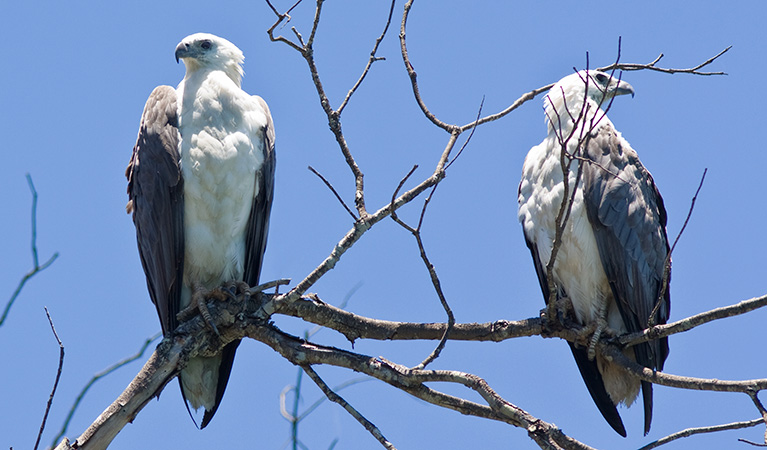
White-bellied sea eagle (Haliaeetus leucogaster)
White-bellied sea eagles can be easily identified by their white tail and dark grey wings. These raptors are often spotted cruising the coastal breezes throughout Australia, and make for some scenic bird watching. Powerful Australian birds of prey, they are known to mate for life, and return each year to the same nest to breed.
Education resources (1)
General enquiries
- National Parks Contact Centre
- 7am to 7pm daily
- 1300 072 757 (13000 PARKS) for the cost of a local call within Australia excluding mobiles
- parks.info@environment.nsw.gov.au
Operated by
- Ulladulla office
- Monday to Friday, 9am to 4pm.
- 02 4454 9500
- npws.shoalhaven@environment.nsw.gov.au
- Lot 9 Blackburn Industrial Estate, 6 Coller Road Ulladulla NSW 2539
Park info
- in Meroo National Park in the South Coast region
Meroo National Park is always open but may have to close at times due to poor weather or fire danger.
What's nearby:
Things to do (95)
- Aboriginal culture (4)
- Adventure sports (1)
- Beach (3)
- Birdwatching and wildlife encounters (47)
- Canoeing/paddling (18)
- Cycling (3)
- Fishing (20)
- Geotourism (1)
- Historic heritage (4)
- Horse riding (1)
- Picnics and barbecues (25)
- Road trips and car/bus tours (3)
- Sailing, boating and cruises (3)
- Sightseeing (48)
- Snorkelling and scuba (11)
- Surfing (6)
- Swimming (28)
- Walking (47)
- Waterfalls (4)
- Wildflowers (seasonal) (7)
